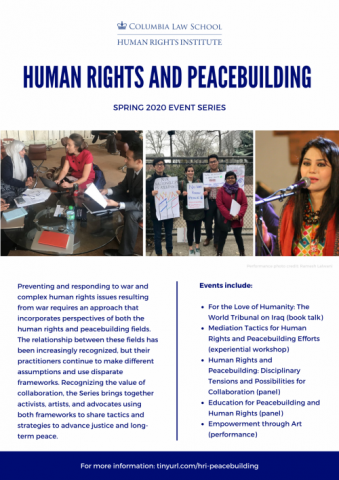The Human Rights Institute Peacebuilding and Human Rights Spring 2020 Event Series

Preventing and responding to war and the large-scale, complex human rights issues resulting from war requires an approach that incorporates the perspectives and strategies of both the human rights and peacebuilding fields. The relationship between these fields has been increasingly recognized, but their practitioners continue to make different assumptions; to operate with disparate analytical frameworks, tactics, and strategies; and to navigate distinct structural constraints. Recognizing the value of collaboration between these fields, the Human Rights and Peacebuilding Event Series brings together activists, artists, and advocates using both frameworks to discuss and share approaches, challenges, and strategies to advance justice and long-term peace.
This series is curated by the Human Rights Clinic Legal Fellow Gulika Reddy. Co-sponsors of the Series’ events include the Center on Global Legal Transformation, the Committee on Global Thought (CGT), the Columbia Human Rights Law Review (HRLR), the Middle Eastern Law Students Association (MELSA), Rightslink, the South Asian Law Students Association (SALSA), and the Columbia Law School Henry Schneider Speaker Series.
Spring 2020 Program:
Book Talk: For the Love of Humanity: The World Tribunal on Iraq
Ayça Çubukçu, Associate Professor in Human Rights and Co-Director of LSE Human Rights, London School of Economics and Political Science. Introduced by: Katharina Pistor, Edwin B. Parker Professor of Comparative Law and Director of the Center on Global Legal Transformation, Columbia Law School.
January 29 | 12:10- 1:10 PM | Jerome Greene Hall 102B
The global anti-war movement against the invasion and occupation of Iraq crystalized on February 15, 2003, when millions of people simultaneously demonstrated in six hundred cities around the world. The World Tribunal on Iraq (WTI) emerged from this global anti-war movement “to tell and disseminate the truth about the Iraq war.” Between 2003 and 2005, in the absence of official institutions of justice willing or able to perform the task, the WTI established a globally networked platform where the reasons and consequences of the war could be investigated, and those responsible for the destruction of Iraq could be publicly judged. In this lecture, and based on two years of fieldwork with WTI activists around the globe, Ayça Çubukçu will discuss the transnational praxis of the World Tribunal on Iraq to address challenges of forging global solidarity through an anti-imperialist politics of human rights and international law.
Human Rights and Peacebuilding: Disciplinary Tensions and Possibilities for Collaboration
Jayathma Wickramanayake, Secretary General’s Envoy on Youth, United Nations; Zachary Metz, Director of Peace Building Practice, Consensus, and Adjunct Assistant Professor, School of International and Public Affairs, Columbia University; and Kristina Eberbach, Deputy Director, Institute for the Study of Human Rights, and Adjunct Assistant Professor, School of International and Public Affairs, Columbia University.
February 25 | 12:10-1:10 | Jerome Greene Hall 103
The relationship between the human rights and peacebuilding fields has been increasingly recognized. The 2030 Agenda for Sustainable Development explicitly combines the promotion of peaceful, just, and inclusive societies, and the United Nations Human Rights Council acknowledged the critical relationship between human rights and peacebuilding in 2017. However, despite their shared goals of justice and peace, practitioners in both fields operate with different frameworks and use distinct strategies. Additionally, the interventions of one field sometimes hinder rather than bolster the efforts of the other one. This conversation features human rights and peacebuilding practitioners who will discuss tensions as well as possibilities for collaboration between the two fields.
Methods of Resistance Under Occupation in Kashmir and Palestine
Lana Tatour, Ibrahim Abu-Lughod Fellow, Center for Palestine Studies, Columbia University; Mahum Shabir, Harvard College & CUNY Law School, Stand with Kashmir Network
February 27 | 12:10-1:10 PM | Jerome Greene Hall 107
This event examines the passive and active ways in which people living under occupation in Kashmir and Palestine resist state oppression and find places to thrive culturally, socio-politically, and academically. The discussion aims to highlight the differences and parallels between the experiences of occupied peoples across borders, and to foster a dialogue on the connections that have been built and can be built across occupied territories.
Mediation Tactics for Human Rights and Peacebuilding Efforts: An Experiential Workshop
Alex Li, Haley Ling, Idun Klakegg, Jenny Ange, Jamie Chang, Audrey Chao, and Ricardo Morales, Mediation Clinic, Columbia Law School
April 23 | 12:10-1:10 PM | Join via Zoom at shorturl.at/gPUV8
Mediation is a critical skill for conflict resolution as well as the promotion of human rights, and is used by the United Nations, NGOs, and a range of other actors and institutions. Participants in this workshop will learn to facilitate conflict resolution and will practice a range of skills including summarizing, framing, active listening, asking the right questions, and stroking. The workshop will also include a discussion of how these mediation skills can be applied to peacebuilding and human rights work.
